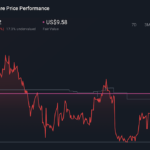Nvidia’s AI pedigree is unrivaled, but some investors are looking for alternatives.
There’s little question that one of the driving forces behind the ongoing bull market is the accelerating adoption of artificial intelligence (AI), and the poster child for that shifting paradigm is Nvidia. The company’s graphics processing units (GPUs) provide the computational horsepower needed for AI and have quickly become the gold standard. As a result, Nvidia continues to deliver quarter after quarter of record-setting results, which has sent its stock price soaring.
However, some investors are concerned that growing competition and the stock’s lofty valuation make Nvidia increasingly risky. Consequently, these same investors are looking for other ways to profit from the AI revolution. One place to look for other ideas is among the holdings of successful hedge fund managers.
One such money manager is Daniel Loeb. The billionaire heads up Third Point, the hedge fund he founded in 1995. Loeb turned seed money of just $3.4 billion — raised from family and friends — into a financial empire with assets under management of $12 billion.
Loeb has left no doubt about the potential implications of AI, calling it “transformational” and ultimately sparking a “profound economic upheaval.” In fact, the famed investor is so bullish about AI that it’s the “key element of the thesis for nearly half” the hedge funds stock holdings. Just four stocks make up his largest AI investments.
Image source: Getty Images.
Artificial intelligence stock No. 1: Amazon — 11.4% of holdings
Third Point’s largest AI holding — and largest position overall — is Amazon (AMZN 0.77%), a stock that he has held continuously since 2019. He notes that AI favors incumbents like Amazon “who are deploying their financial and intellectual war chests to win the AI arms race.”
He’s clearly done his homework. Amazon quickly positioned itself to capitalize on the AI opportunity, offering a roster of the most in-demand AI models to its cloud customers, while also creating its own, but that’s just the beginning. Amazon is using AI to identify and store inventory 75% more quickly while bringing down order processing times by 25%, giving its legacy online retail business a boost. The company also uses AI to better address the target audience for its digital ads.
Loeb’s Amazon position remained unchanged in the second quarter, with a total stake of 5.1 million shares worth about $986 million and nearly 11% of Third Point’s portfolio. And at less than 3 times forward sales, Amazon is an attractively priced way to play the AI revolution.
As a longtime Amazon shareholder, I’m completely on board with Loeb. Not only is Amazon the leading provider of e-commerce and cloud computing, but it’s also a growing power player in digital advertising. Adding AI into the mix gives Amazon another way to win when the odds are already stacked in its favor.
Artificial intelligence stock No. 2: Microsoft — 8.1% of holdings
Third Point’s second-largest AI holding and third-largest overall is Microsoft (MSFT 0.61%). Loeb views the software giant as one of the “best-run legacy” companies, which has “built enormous competitive advantages” and is well positioned to benefit from the adoption of AI.
His logic is irrefutable. Like Amazon, Microsoft offers a wealth of AI models to cloud customers. However, the company’s biggest AI opportunity is likely Copilot, Microsoft’s suite of AI-powered digital assistants. Designed for a variety of industries and tasks, Copilot can streamline tasks and automate time-consuming chores, thereby increasing productivity. Demand for Copilot has been robust and has also helped boost the adoption of its cloud services. Microsoft’s noted in the calendar second quarter that eight points of Azure Cloud’s growth were the result of AI services.
Third Point trimmed its Microsoft position by about 11% in the second quarter, likely to expand its exposure to other AI stocks (more on that shortly).
Microsoft stock is selling for a premium at 38 times earnings. However, the company’s strong legacy businesses and early positioning in AI show it’s deserving of a premium.
I’m a firm believer that Microsoft has a long runway ahead. Generative AI will continue to evolve and Copilot is an early mover in the space. When added to the company’s existing businesses, AI gives Microsoft an extraordinary competitive advantage — which is why I own the stock.
Artificial intelligence stock No. 3: Meta Platforms — 6.4% of holdings
Loeb’s third largest AI holding and fourth overall is Meta Platforms (META 0.28%). Loeb hasn’t been as vocal about his position in the tech giant but is likely bullish on the recovery in digital advertising, as targeted ads on its social media platforms generate 98% of its revenue. However, Meta also made a surprising move to capitalize on AI, which likely also informed Loeb’s decision.
Meta moved into AI contention by quickly developing its Large Language Model Meta AI (LLaMA), an AI model that is carried by all the major cloud platforms for a fee. This AI system is fueled by a treasure trove of data from the billions of users on Facebook, Instagram, WhatsApp, Threads, and Messenger. AI is a new revenue stream for Meta, so we don’t yet know how lucrative it might ultimately be.
Third Point’s stake in Meta amounts to 1.1 million shares worth roughly $555 million. Similar to Microsoft, Loeb trimmed his position in the second quarter by about 11%, likely to spread his AI bets (more on this below).
The stock currently sells for less than 27 times earnings, a discount compared to a multiple of 29 for the S&P 500 (^GSPC -0.00%).
I’m equally bullish on Meta Platforms. I think the company’s move to leverage its user data to create AI models was nothing short of brilliant. Add to that Meta’s ever-expanding advertising prowess and you have the recipe for long-term success.
Artificial intelligence stock No. 4: Apple — 4.7% of holdings
There was a notable addition to Third Point’s portfolio last quarter, that of Apple (AAPL 1.46%). Loeb loaded up, acquiring nearly 2 million shares of the iPhone maker in a stake valued at roughly $411 million and representing nearly 5% of his portfolio.
Loeb noted that while some investors fear Apple may “be an AI loser,” he takes a different view. He cited the company’s 2.2 billion devices and wide selection of electronic devices as an advantage and believes ” AI-related demand could drive a step-change improvement in Apple’s revenue and earnings over the next few years.” He further suggests that the company’s recently announced Apple Intelligence — a suite of AI-powered smartphone features — will drive “meaningful demand” from Apple’s installed base.
Investor sentiment has weighed on Apple stock since early last year, as some fear that AI had left the company behind, but I think that view is myopic. Apple has a long history of taking the time to put its unique stamp on its products and services, which has helped make it the most valuable publicly traded company in the world. Investors who dismiss Apple do so at their own peril.
The biggest opportunity?
I own all four of these AI-centric stocks and believe they’re all worth owning, but two stand out, albeit for different reasons.
Since generative AI kicked off in earnest early last year, Apple stock has gained just 62%, the lowest among our quartet of stocks. Investors are waiting to see what the iPhone maker will unveils during its next product update on September 9. This could be the catalyst Apple needs to send its shares higher.
Strictly from a valuation perspective, Meta Platforms remains the most attractively priced, at less than 26 times earnings, compared to a multiple of 29 for the S&P 500.
That said, each of these stocks represents a compelling opportunity in the AI revolution.
Randi Zuckerberg, a former director of market development and spokeswoman for Facebook and sister to Meta Platforms CEO Mark Zuckerberg, is a member of The Motley Fool’s board of directors. John Mackey, former CEO of Whole Foods Market, an Amazon subsidiary, is a member of The Motley Fool’s board of directors. Danny Vena has positions in Amazon, Apple, Meta Platforms, Microsoft, and Nvidia. The Motley Fool has positions in and recommends Amazon, Apple, Meta Platforms, Microsoft, and Nvidia. The Motley Fool recommends the following options: long January 2026 $395 calls on Microsoft and short January 2026 $405 calls on Microsoft. The Motley Fool has a disclosure policy.







